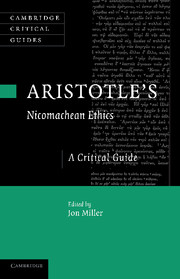Book contents
- Frontmatter
- Contents
- Contributors
- Acknowledgments
- Abbreviations and transliteration
- Introduction
- Part I Textual issues
- Part II Happiness
- Part III Philosophical psychology
- Chapter 5 Aristotle???s definition of non-rational pleasure and pain and desire
- Chapter 6 Non-rational desire and Aristotle???s moral psychology
- Chapter 7 Aristotle, agents, and actions
- Chapter 8 Perfecting pleasures
- Chapter 9 Inappropriate passion
- Part IV Virtues
- Bibliography
- Index
Chapter 9 - Inappropriate passion
Published online by Cambridge University Press: 07 September 2011
- Frontmatter
- Contents
- Contributors
- Acknowledgments
- Abbreviations and transliteration
- Introduction
- Part I Textual issues
- Part II Happiness
- Part III Philosophical psychology
- Chapter 5 Aristotle???s definition of non-rational pleasure and pain and desire
- Chapter 6 Non-rational desire and Aristotle???s moral psychology
- Chapter 7 Aristotle, agents, and actions
- Chapter 8 Perfecting pleasures
- Chapter 9 Inappropriate passion
- Part IV Virtues
- Bibliography
- Index
Summary
In his Metaphysics Aristotle repudiates the poets’ claim that envy (phthonos) is natural to the divine nature, citing the adage that bards tell many lies (i.2, 982b32–983a4). The repudiation is noteworthy: Aristotle does not normally deny passions to gods or quarrel with poets. Presumably, it is indebted to his view that envy is named in a way that involves badness, is a wicked passion, and something that is felt by those who are bad (N.E. ii.6, 11078a8–13; E.E. ii.3, 1221b18–23; Rh. ii.11, 1388a34–36). Even so, his repudiation provokes several questions. What is Aristotle’s understanding of envy and its wicked nature? How does this sort of badness compare to and contrast with inappropriate realizations of passions such as anger and fear? How do passions relate to the character of those who feel them? Does (and, if so, how does) Aristotle’s understanding of passions’ inappropriateness in ethical matters fit with his understanding of their value elsewhere?
The essay to follow investigates these questions, beginning with Aristotle’s most pervasive thoughts on passions’ inappropriateness, and their connections to character (section 1). The baseness of wicked passions is then explored (section 2), followed by an examination of envy (section 3) and its baseness (section 4). That and how envy suits Aristotle’s doctrine of the mean is considered (section 5), as is the inappropriateness and appropriateness of passions in diverse domains (section 6).
- Type
- Chapter
- Information
- Aristotle's Nicomachean EthicsA Critical Guide, pp. 211 - 236Publisher: Cambridge University PressPrint publication year: 2011
- 4
- Cited by



